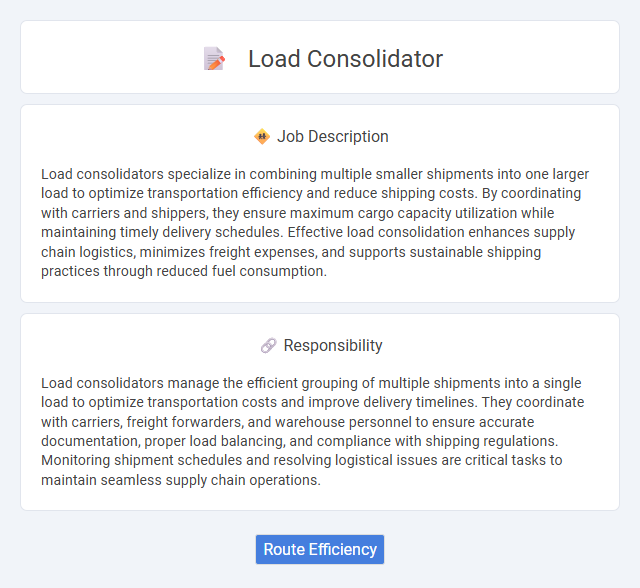
Load consolidators specialize in combining multiple smaller shipments into one larger load to optimize transportation efficiency and reduce shipping costs. By coordinating with carriers and shippers, they ensure maximum cargo capacity utilization while maintaining timely delivery schedules. Effective load consolidation enhances supply chain logistics, minimizes freight expenses, and supports sustainable shipping practices through reduced fuel consumption.
People with strong organizational skills and the ability to manage multiple tasks efficiently are likely suitable for the Load Consolidator job. Those who prefer a dynamic environment and can work well under deadlines probably adapt better to the demands of this role. Individuals who struggle with repetitive tasks or require constant supervision may find this position less compatible with their working style.
Qualification
A Load Consolidator must possess strong organizational skills and expertise in logistics or supply chain management, typically requiring a high school diploma or equivalent; however, advanced roles may demand a bachelor's degree in business or logistics. Proficiency in transportation management systems (TMS), inventory control, and knowledge of shipping regulations ensures efficient load planning and execution. Effective communication and problem-solving abilities are essential for coordinating carriers, optimizing load capacity, and reducing transportation costs.
Responsibility
Load consolidators manage the efficient grouping of multiple shipments into a single load to optimize transportation costs and improve delivery timelines. They coordinate with carriers, freight forwarders, and warehouse personnel to ensure accurate documentation, proper load balancing, and compliance with shipping regulations. Monitoring shipment schedules and resolving logistical issues are critical tasks to maintain seamless supply chain operations.
Benefit
Load consolidator roles likely provide significant benefits by optimizing transportation costs and improving delivery efficiency, leading to reduced operational expenses for companies. This job probably enhances supply chain reliability by effectively coordinating shipments and minimizing delays. Individuals in this position may gain valuable experience in logistics management and develop skills in data analysis and vendor coordination.
Challenge
The load consolidator job likely involves managing complex logistics to efficiently combine multiple shipments, which can present challenges in coordinating schedules and routing. There is a probability of encountering unpredictable delays or last-minute changes that require quick problem-solving and adaptability. Ensuring accurate documentation and maintaining communication between shippers and carriers may also pose ongoing challenges in this role.
Career Advancement
Load consolidators optimize freight shipments by combining multiple loads to maximize efficiency and reduce transportation costs, contributing to streamlined supply chain operations. Mastery in route planning, logistics software, and carrier negotiations develops expertise vital for higher roles like logistics manager or supply chain analyst. Career advancement opportunities arise through building strong vendor relationships, improving operational workflows, and leveraging data analytics to enhance overall freight management strategies.
Key Terms
Route Efficiency
A Load Consolidator enhances route efficiency by strategically combining multiple shipments into a single load, reducing transportation costs and minimizing empty miles. Utilizing advanced routing algorithms and real-time data, they optimize delivery schedules and vehicle utilization. Effective load consolidation leads to streamlined logistics operations, improved fuel efficiency, and faster transit times.
 kuljobs.com
kuljobs.com